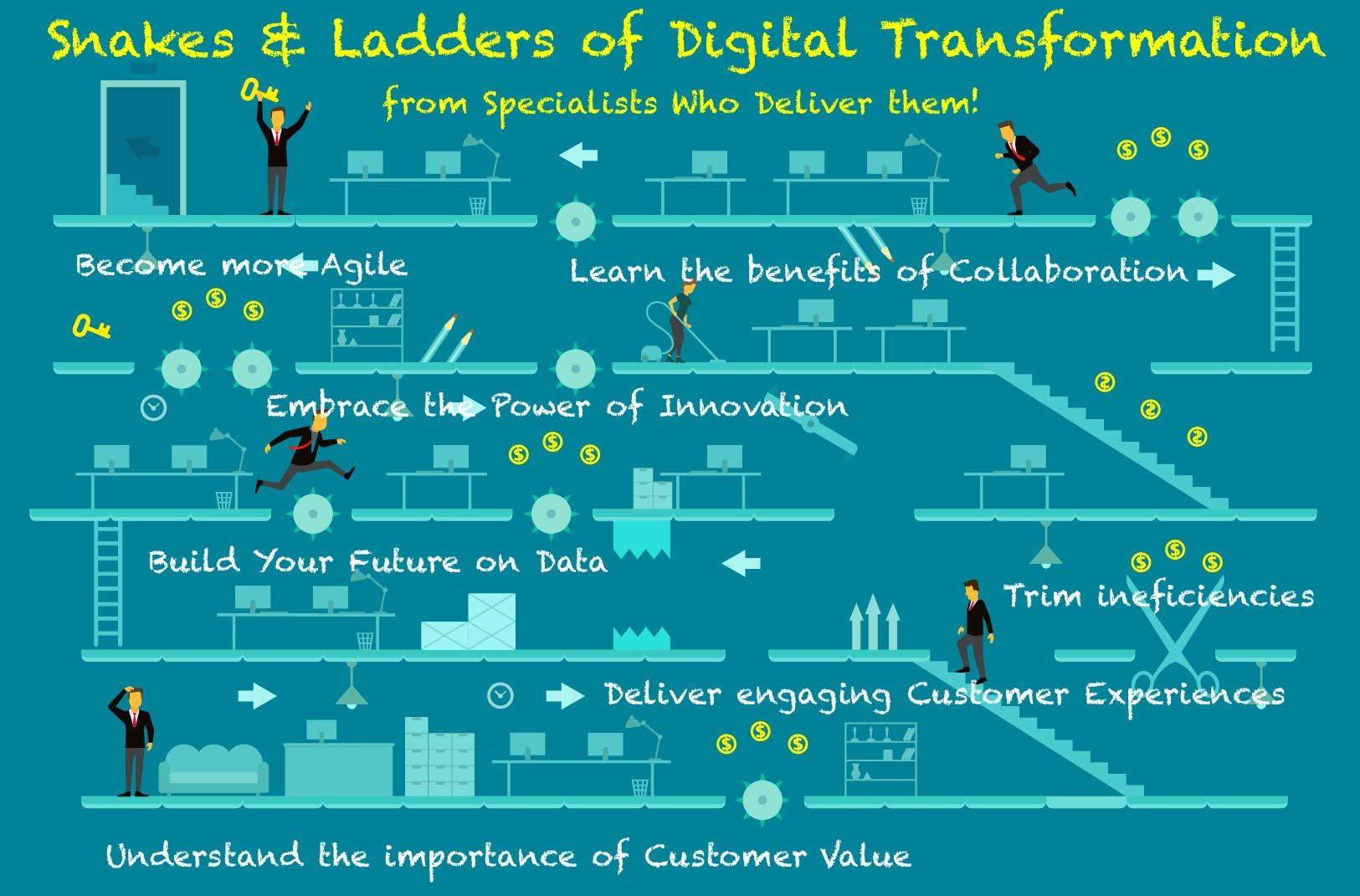Blog Layout
Digital Transformation – Is It Important
Digital Transformation – Is It Important

What is Digital Transformation?
Simply put, Digital transformation
is a journey, not a destination. It introduces a new way of thinking and a new way of working. Whether we embrace it or not, it is an unstoppable movement that is constantly changing and evolving. Empowered by technology, people, experiences, values, data, and innovation it is important for us to understand how it works.
Today if our customers want to buy something, they often want it fast, and they want the journey to be fun. Especially when they are probably doing the deed on their Smart Phone, or at least a Smart device. So from a business perspective to keep them onboard, their User Journey has to be engaging, and their User Experience therefore needs to be well thought out and innovative. They want to follow a simple process of search, buy, download and play and all of this in the blink of an eye.
Honestly, Digital Transformation is anything you want it to be. But to seperate yourself from your competition and engage your customer time and loyalty, you need to deliver effective and emotional experiences that will drive their loyalty.
Technology
To do this a business needs a good technology infrastructure that is robust, scalable, always available, and fast. It must be able to run multiple applications to support a host of business services, and it must allow the business to update any one of the parts, without significantly impacting the whole. Cloud computing architecture offers this, and at a scalable price too. Without having this architecture that allows you to react fast, and adapt to your customer’s changing needs, you won’t have fully engaged the technology for disruption that digital transformation offers your business.
To stay competitive the business must be able to continually update and deploy changes and fixes to their infrastructure (or backend) without impacting their service delivery (User Experience). This is to maximise evolution through technology, innovation and creativity.
Having a scalable model allows you to maximise your technology infrastructure by adapt to your customer’s constantly changing needs, without disrupting business. You can adopt applications developed in-house or elsewhere to ensure competitive advantage, and create business processes that converge at the point of intersection with customer experiences. This brings me to our next topic, empowering your talent.
Empower your Talent
Not only does your business need the right technology to engage in digital transformation, but to fully benefit from this disruptive process you need to empower your staff. This means that they need the freedom to challenge the current domain and entice their creativity to inspire innovation.
Businesses need to ensure they build a modern workplace that empowers people to achieve their potential by accommodating different workstyles. This can take many forms, but in essence it is the creating of familiar productivity tools with digital capabilities that encourage people to grow in digital literacy. It also facilitates them working from anywhere and as a combination, ensures they protect amongst other things, the businesses data. Importantly, it also needs to encourage them to disrupt the normal process. This will engage their creativity, which will ultimately lead to innovation which in turn results in the building of valuable digital products and services, that engage with your customer.
The resultant creation of modern business processes that engage the digital technology will increase the efficiency of your talent pool, free their creativity, and in some cases lead to an innovative mindset. By using an Agile approach with smaller teams able to react more quickly and efficiently to changing business needs, the knock-on effect leads to the customer benefitting from these improved business outcomes. Automation ensues, and allows your business to harness the power of the Internet of things (a future topic for discussion).
Result
As a business optimises its potential through digital transformation, it goes from being reactive, to being able to respond real-time, to being pre-emptive in anticipation of its customers’ needs. Ultimately resulting in the creation of valuable digital products and services for the here and now. Profitablility ensues and satisfaction is not far behind.
I look forward to your comments below, and thanks to our friends at Wiki for the links.
What do you think is important in this Digital Transformation process?
Please share your thoughts below…
Other Business Insights from FranklyWeird Digital

by Gregory Weir
•
5 August 2022
As we already know, doing a core banking transformation or migrating to a cloud environment will help to improve our operational performance, workload scalability, security & time-to-market (CICD). We need to exploit every advantage we can in order to stay competitive.

by Gregory Weir
•
15 May 2020
Until a few months ago digital transformation was a ‘nice-to-have’, with many of us working on various digital initiatives both in the workplace and at home. Today as we slowly come to terms with the fact that things are never probably going to be exactly the same, and in order to survive and for that matter thrive, business leaders are going to have to quickly realise that the digital transformation ‘want’ has to become a ‘need’.

28 January 2020
No matter how we investigate where we are in the process, it remains a fact that digital transformation needs to be taken seriously, as it can often be the main driver of competitiveness. Knowing exactly where you are during the 4 stages of digital transformation, as you strive to build meaningful digital products and services, may be the best way for your business to survive.
